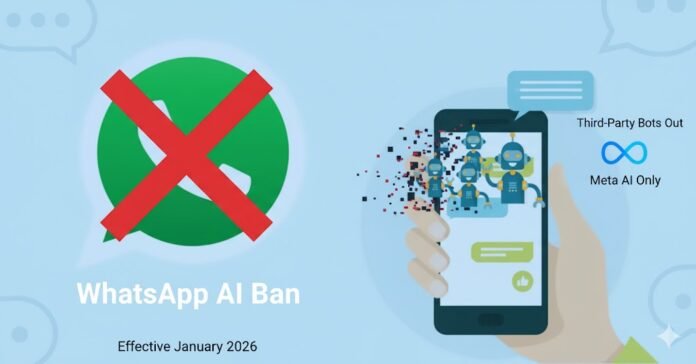WhatsApp AI bans the third-party app bots. Meta’s latest policy states that starting January 2026, third-party generative AI and chatbots will be restricted from WhatsApp.
Over three billion people use WhatsApp every month. For many people, WhatsApp is more than just a messaging application—it is a powerful tool for personal communication, business management, and even online shopping. In more recent years, WhatsApp has also become a major space where generative AI, like AI assistants and chatbots, has been deployed, including OpenAI’s ChatGPT and Perplexity. Meta has recently indicated a major change in strategy by limiting access to most third-party AI bots. This is the new era of the WhatsApp AI Ban.
Regulatory changes are certainly on the way. For example, as of January 15, 2026, a new rule regarding AI technology and WhatsApp’s Business Solution will come into play. Restrictions will also apply to generative AI services. This regulatory move confirms the WhatsApp AI Ban policy.
It seems the platform may limit the most basic, knowledge-based AIs that were able to multiply across the platform. These were the most advanced AIs that could process requests, analyze media, reply to voice messages, and generate images, most likely the most text messages sent and the primary source of system strain. In the near future, the only competitor will be Meta AI, the integrated agent of the parent company, which will be the only assistant AI running and operating within the app.
Of course, there is no question about service AI. Meta quickly and effortlessly reassured the business world about the nuances of change, stating that the new policy would not touch businesses that use AI to assist customers. Retailers, travel agencies, and service providers that use AI to tailor services, automate management, provide real-time updates, and control bookings will continue to operate. This exception is vital to the WhatsApp AI Ban rollout.
As a spokesperson explained policy impacts to TechCrunch, no general-purpose AI was designed to be a high-volume AI conversation host and overload the system. The WhatsApp Business API was designed to allow businesses to provide essential services and real-time updates, not host high-volume AI conversations.
Why did Meta choose this course of action? Meta’s reasoning centers about the concentration of system capacities. Right now, the system that’s designed to assist general-purpose chatbots is near its capacity. Also, when a support chatbot addresses a user, it triggers a complex and large-scale interaction that requires a massive chunk of system resources. This level of support is disproportionate when viewed within the mission of the primary support system. The increasing demand directly led to the WhatsApp AI Ban.
Meta’s probable mission is resource-focused system support and the protection of the model’s design and strategic intent surrounding direct transactional and interaction frameworks between clients and users. Offloading resource-demanding general-purpose AIs from Meta protects system revenue and short-term revenue. This strategy shift is a direct result of the WhatsApp AI Ban.
Ultimately, shifts in strategy from a large corporation like Meta are almost always financially motivated. The WhatsApp AI Ban aligns with this motivation.
Some industry experts think the main motive is the profit. The WhatsApp Business API is a paid service and thus another source of revenue for Meta. Moreover, the tiered pricing models are based on a finite range of business messages, which the high-volume, general-purpose AI chatbots contracts do not fit within very well. It is the unrestricted, unlimited conversations that pose the greatest risk to the prospect of monetizing the platform. The WhatsApp AI Ban addresses this monetization risk.
To Zuckerberg, who has stated that this is the company’s future, the financial engine for server elasticity is a fundamental and scarce resource. That is what the policy change is ultimately about.
In Meta’s Q1 2025 earnings call, CEO Mark Zuckerberg characterized business messaging as ‘the next pillar’ in building Meta’s revenue strategy.
“Advertising on Facebook and Instagram feeds makes up most of our revenue,” Zuckerberg said. “But then, there’s WhatsApp. Over 3 billion people use WhatsApp each month and more than 100 million of those are in the United States. Messenger has more than a billion users and the number of messages sent on Instagram every day is the same as those sent on Messenger. That’s why we need to focus on business messaging.” This focus provides the context for the WhatsApp AI Ban.
Meta’s decision to step back from partnerships with third-party AI tools is explained by the need to control user engagement through Meta AI to monopolize and optimize the user experience and profitability of this core revenue pillar. The ultimate goal is served by the WhatsApp AI Ban.
The users, in this case, would be those people with no interfacing with popular external AI tools. Meanwhile, Meta is arbitrarily setting the user experience with WhatsApp, which is a tool to facilitate business exchanges, to capture profit that the company target in the foreseeable future. The WhatsApp AI Ban shapes this future.
Shortly, the desktop app will be gone, and so will the free-roaming, unprofitable AI agents. The finality of the WhatsApp AI Ban is clear.



